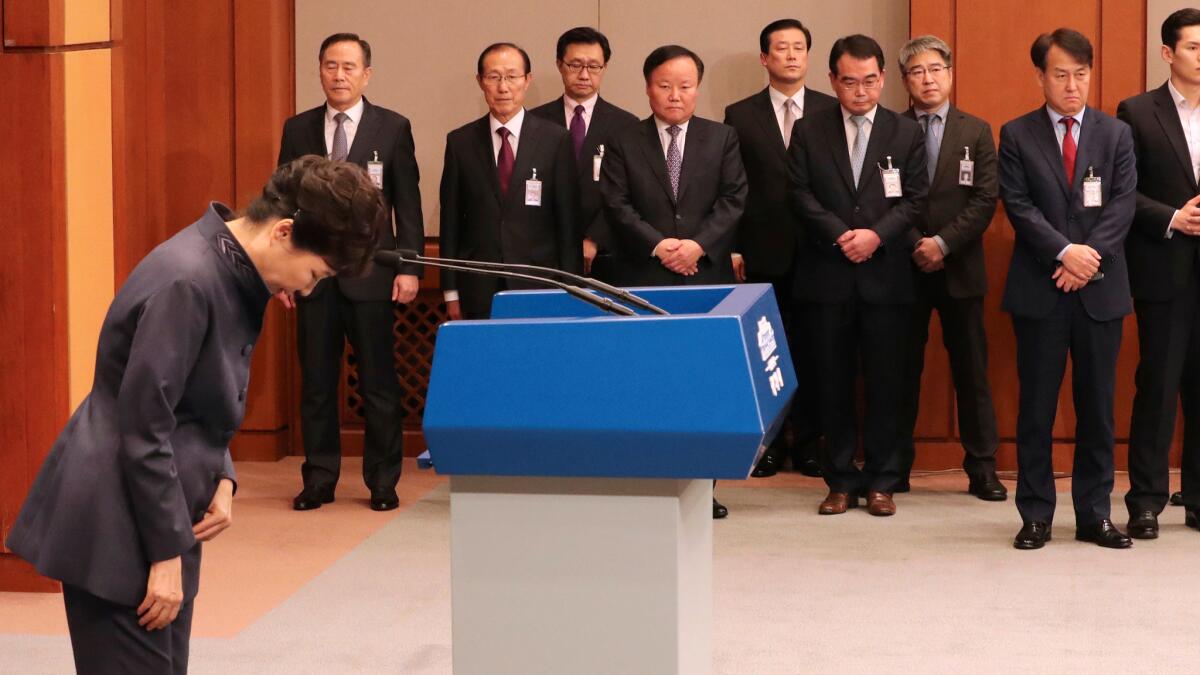Back Story: A South Korean scandal with overtones of Clinton’s emails
- Share via
Reporting from Seoul — On Tuesday, South Korean President Park Geun-hye stepped to the podium, facing dozens of news cameras and what might be the biggest challenge of her presidency. She made a hastily arranged public apology for a growing scandal that has been roiling South Korean politics for weeks.
The scandal revolves around a close associate of Park’s, Choi Soon-sil, the daughter of Park’s late mentor, and charges that Choi used her ties to the president to pressure corporations to cough up millions in donations to dubious foundations that Choi allegedly used like a personal ATM. Park has also been accused of blindly following directives from Choi, someone with no job in government or official public profile.
What sparked Tuesday’s apology was a report the previous day by a South Korean television network, part of a media maelstrom in recent weeks, which revealed that an old computer hard drive belonging to Choi contained classified documents Park had sent her. In a furor similar to that surrounding Hillary Clinton’s use of an email server, critics charged that Park was irresponsibly managing official information.
What is she apologizing for?
In her address Tuesday, Park said that she had sought Choi’s help with public outreach when she was running for president in 2012. The president did not make any direct mention of the allegations of Choi’s ties to the foundations; she only apologized for having caused “public distress” through unspecified acts.

Why apologize now?
Until Tuesday, Park had avoided commenting on the scandal, but the report about the computer hard drive apparently made it impossible to her to stay on the sidelines any longer. “She is trying to put a lid on the issue, which is threatening to derail the public discourse,” said Christopher Green, a researcher in Korean studies at Leiden University in the Netherlands and co-editor of Sino-NK, an online journal of northeast Asian affairs.
This is only the third time Park has apologized for anything as president, the most recent being for the government’s botched response to the 2014 Sewol ferry sinking, in which more than 300 people died, many of them high school students.
What was the domestic reaction to her apology?
It didn’t take long for Park’s critics on social media to pounce on her apology as fodder for ridicule, describing her address as soulless and perfunctory. The line most commenters seized on was Park’s contention that her dealings with Choi were carried out “with a pure heart.”
“With a pure heart” quickly became the top trending item on Korean language Twitter, as users mocked Park’s choice of words, calling it a lame attempt at sounding sincere. “If your heart is so pure then obey the law,” wrote one user, who also asked, “So if I rob a bank with a pure heart, is that OK?”
Others wondered whether Park’s statement really amounted to an apology at all. “If you start by saying what you did was with a pure heart, doesn’t that mean you’re not really apologizing?” asked another Twitter user.
Who is Park?
Even before she became president in early 2013, Park was by far the most recognizable politician in South Korea. Born in 1952, she has been in the public eye since childhood, when her father, military dictator Park Chung-hee, ruled the country.
She assumed the duties of first lady in 1974, when her mother was shot to death during an assassination attempt on her father. Five years later, her father was assassinated by a top official in his government.
Her father left a complicated legacy. While in power, he oversaw South Korea’s most dramatic period of economic development, driving the country from postwar poverty to industrialized wealth. Along the way he suspended most civil and political rights, and there is still debate in South Korea over whether he should be remembered as a hero or a tyrant.
Park came into office carrying her father’s legacy as baggage. To some South Koreans, she is the second coming of the country’s proudest era; to others, she represents an unwelcome return of her father’s undemocratic rule, even though she was elected.
What does this mean for the rest of Park’s presidency?
As the scandal has dragged on, Park’s approval rating has hit its lowest point since she came to office. That may not matter so much, as Park isn’t eligible to run for reelection when her term ends in early 2018 (South Korean presidents all serve one five-year term).
On the near horizon, Park likely faces friction with the liberal opposition.
“The opposition parties will certainly make the best of the opportunity and frame the scandal as a problem with the conservative side of the spectrum, but whether that strategy resonates with voters is an open question,” said Steven Denney, a graduate fellow at the Asian Institute at the University of Toronto and a specialist on South Korean politics.
Borowiec is a special correspondent.
ALSO:
The ‘world’s saddest’ polar bear is trapped in a tiny cage at a shopping mall in China
Here’s why the death of a 68-year-old farmer set off bitter protests in Seoul
More to Read
Sign up for Essential California
The most important California stories and recommendations in your inbox every morning.
You may occasionally receive promotional content from the Los Angeles Times.













